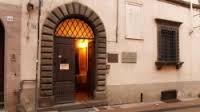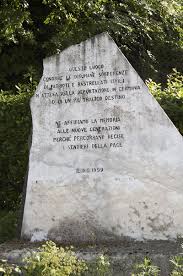In the summer of 2001 my Honda Transalp bike and I found ourselves near that most splendid of Polish cities: Cracow. Meeting up with a group of bikers at a campsite a little way outside the city I compared notes and one of the bikers said “we’re quite near Oświęcim”.
That name, translated in German is Auschwitz, and, as any sentient human knows, it is the site of one of the most horrible killing machines in the history of (in)humanity.
The following day I visited both Auschwitz and Birkenau. I climbed up into the entrance watchtower made famous in the film “Schindler’s List”. No-one else was there. I looked out onto to the vast flatness of the camp – most of the barracks had vanished but their foundations remained to show how huge the camp had been. In the far right-hand corner I could make out the mangled ruins of the crematorium blown up by the camp officials when they abandoned it in the face of the Russian army’s advance. Strange feelings of desolation, utter emptiness, and complete annihilation assaulted me. I had to get out and rushed down the stairs silently screaming.
Yet so many never got out….
Afterwards I went for a walk around the camp perimeter. A family was picnicking near the interminable stretch of barbed wire fence. I walked into a little wood.
AUSCHWITZ 2001
Ash pond reflects clouds
silence by the little wood
a stork takes to flight.
Twisted iron bars
concrete minds
rusty furnaces:
Resurrection’s castle
Is a heap of crumbling concrete
Anybody who’s been there will understand these lines. If I explained them here I’d just start weeping.
Today it’s the “giornata della memoria” in Italy – a day dedicated to remembering the victims of the holocaust (and of all other mass crimes against humanity). Outside it’s a drizzling, dank day – no sun as there was yesterday.
Holocaust Remembrance Day was designated by the general assembly of the United Nations in 2005 to commemorate the victims of the Shoah (Hebrew for “catastrophe”). January 27th was chosen because it was the day Auschwitz concentration camp was liberated by allied troops.
In our part of the world, the Mediavalle and the Garfagnana areas of Lucca province, the Todt organization built bunkers, casements, tunnels and anti-tank walls to halt the allied advance up the Italian peninsula. In the Serchio valley and the surrounding mountains around three thousand people are estimated to have worked in the service of Todt for a period of twelve months. The Todt organization had its administrative headquarters in the Santini palace building at Borgo a Mozzano, now the town’s public library.
Many workers were Italian army deserters from the armistice of 8th September 1943 since they were promised they would not be deported to German concentration camps if they worked on building the Gothic line defences. Others were forced labourers, captured during raids and subsequently detained for transportation to Auschwitz at the local concentration camp at Socciglia near Anchiano.
Today that area is an industrial estate and also the place where the Sagra del Bacalà (Norwegian cod festival) takes place at the beginning of May each year to commemorate a happier event, that of the twinning of nearby Anchiano with Aalesund in Norway – not forgetting, too, that Norway was also subject to the Nazi scourge and has its own victims to mourn.
On the alternative route to Lucca from Bagni di Lucca a commemoration stone, dedicated to the majority of those victims who never returned, has been erected on the site of the camp.
I have come across concentration camps before even Auschwitz. In 1997 we passed by another one near Munich where it all started:
DACHAU
The land of lemon groves and honeyed saints
is left behind with the alpine high road;
before us the plains of the north unfold
round a little town with its smiling square
embraced by pink and white baroque mansions.
Yet we are hushed as the road guides along
a tall fence of heavy wood and barbed wire.
Watchtowers punctuate it at intervals
scowling at us like cerberean hounds
salivating for fresh escapee meat.
It was not easy to get here. One’s mind
had to reach the decision and then none
would understand pleas for directions:
You want the town centre? No, I don’t know
a death-camp, but there’s the war museum.
A wide and empty parade-ground stretches
within: this place was planned for officers.
To one side a memorial shrine is manned
by a Turk and his family. They smile
inviting us to the chamber of horrors.
Treated as untouchables in a land
which once saw its own stock as master-race
and poked fun at the seraglio’s secrets
a few years after the imperial city
was almost raped by janissary troops.
So it was here that the rail tracks stopped
for huddled masses of weeping mothers
separated from their crying children
and husbands impotent before their spouse
as the armed greatcoats shoved them to one side.
And this was the new life falsely promised,
the fresh start in a different settlement
with hope of work: from dental surgery
to assistant in medical research.
Job-creation in the third empire style.
Sent to be purified in shower blocks
which released that most powerful human
disinfectant of all: death, agonised
death in the excrement of shock of those
waves that came before and those that followed.
Who climbed over the centre of the roof
to release the crystals of zyklon-B?
Did they apply for the post or draw lots
or merely obey orders which must be
obeyed? I ask but know there’s no answer.
No answer from the razed foundations where
babylonian wails pierced the benighted world.
No answer from the photos of shaven heads,
staring eyes with the look of the dead while
moth wings burn in a lamp’s human shade.
Crescent moon rises on spectral towers
as the casino fills with babbling punters
while coffee and cakes are served in the square
and snapshots are exchanged of summer days
in a land of lemon and orange groves.
“Those that fail to learn from history are doomed to repeat it” said Winston Churchill famously. Whatever one’s political persuasion, neglect of “il giorno della memoria” is neglect of one’s most essential humanity.








Pingback: Giornata della Memoria | barganews.com v 3.0
Reblogged this on From London to Longoio (and Lucca and Beyond) Part Two and commented:
On this day I can only repeat what I wrote a year ago. When will we ever learn?